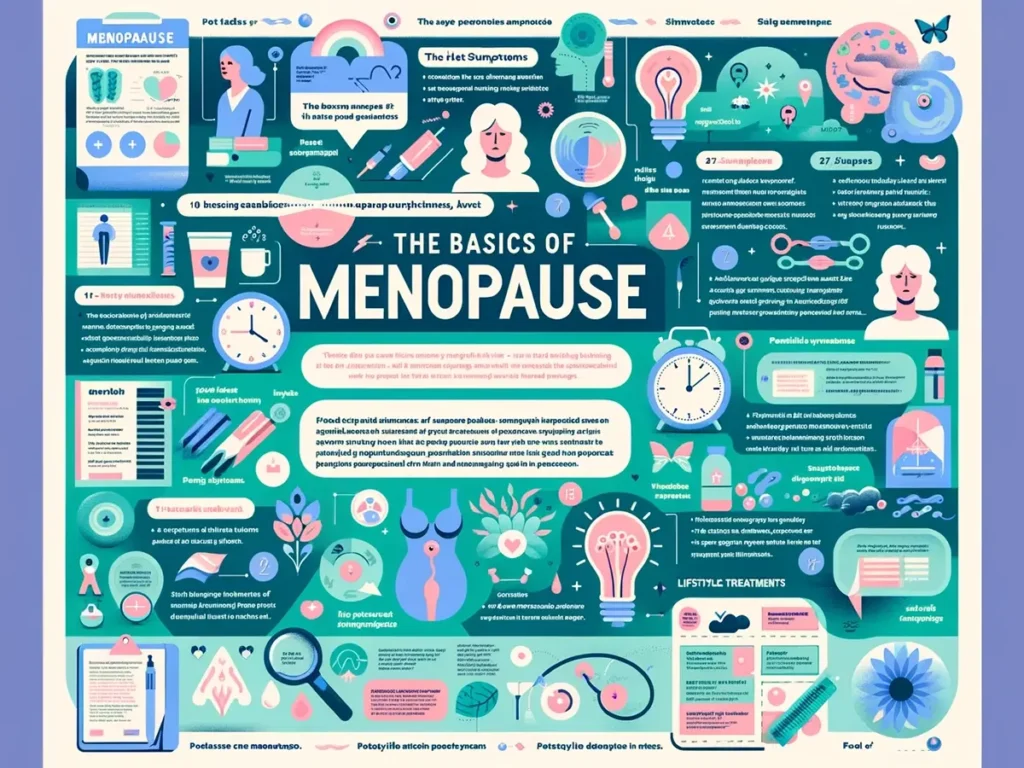Many women approaching or going through menopause may wonder if the symptoms they experience follow a cyclical pattern. Menopause brings a range of physical and emotional changes, from hot flashes and mood swings to insomnia and weight gain. Understanding whether these symptoms occur in a cyclical manner can provide insight into how to manage and cope with them effectively. Let’s research into the topic of whether menopause symptoms are indeed cyclical and explore the factors that may influence these patterns.
Key Takeaways:
- Menopause symptoms are not necessarily cyclical: While some women may experience cyclical patterns with symptoms like hot flashes or mood swings, not all women will have this experience. Symptoms can vary greatly in duration and intensity.
- Individual differences play a significant role: Factors like genetics, overall health, lifestyle habits, and hormonal fluctuations can influence how menopause symptoms are experienced. These variables can make it challenging to predict symptom patterns.
- Tracking symptoms can provide insight: Keeping a journal or using apps to track symptoms can help women identify any patterns or triggers that may be exacerbating their menopause symptoms. This information can then be shared with healthcare providers for personalized treatment options.
- Hormone therapy may help regulate symptoms: For women experiencing severe and disruptive menopause symptoms, hormone replacement therapy (HRT) or other medications can be prescribed to help regulate hormonal fluctuations and reduce symptom severity.
- Consult a healthcare provider for personalized guidance: Due to the individual nature of menopause symptoms, it is important for women to consult with their healthcare provider for guidance and support in managing their unique experiences with menopause.
The Nature of Menopause Symptoms
Clearly, understanding menopause and its symptoms is important for women approaching this stage of life. Menopause is a natural biological process that marks the end of a woman’s menstrual cycles. During this transition, the body undergoes various hormonal changes that can lead to a range of physical and emotional symptoms.
Common Symptoms of Menopause
For many women, common symptoms of menopause include hot flashes, night sweats, changes in mood, difficulty sleeping, and vaginal dryness. These symptoms can vary in intensity and duration from woman to woman, impacting their quality of life and overall well-being. It is important for women to be aware of these common symptoms and seek support from healthcare providers to manage them effectively.
The Idea of Cyclicity in Menopause Symptoms
Symptoms of menopause are often thought to be cyclical in nature, meaning they come and go in a pattern. Some women report experiencing symptoms in waves, where they feel relatively normal for a period and then suddenly experience a surge in symptoms. This cyclical nature of menopause symptoms can be frustrating and confusing for women, as it may be challenging to predict when they will occur.
With proper tracking and monitoring, women can better understand the patterns and triggers of their menopause symptoms. This information can help them develop coping strategies and make informed decisions about their health and well-being during this transitional phase of life.
Hormonal Fluctuations and Symptom Patterns
There’s a complex interplay between hormonal fluctuations and the patterns of menopause symptoms experienced by women. Understanding how hormone levels change during menopause can shed light on the various symptoms that may arise.
Hormone Levels During Menopause
Levels of estrogen and progesterone, two key hormones in the female reproductive system, begin to decline as women approach menopause. These hormonal changes can lead to a wide range of symptoms, including hot flashes, night sweats, mood swings, and vaginal dryness. The decrease in hormone levels can also affect bone density and cardiovascular health.
As menopause progresses, the decline in estrogen levels becomes more pronounced, leading to more intense symptoms for some women. Understanding the role of these hormonal changes can help women and healthcare providers better manage and treat the symptoms associated with menopause.
How Hormone Cycles Influence Symptoms
Cycles of hormonal fluctuations can influence the regularity and intensity of menopause symptoms. For some women, symptoms may follow a cyclical pattern similar to their menstrual cycles, with certain symptoms worsening during specific times of the month. Understanding these patterns can help women anticipate and prepare for potential symptom flares.
Menopause is a unique transition period marked by hormonal shifts that can impact a woman’s physical and emotional well-being. Recognizing the influence of hormone cycles on symptoms can empower women to seek the appropriate support and interventions to navigate this stage of life with greater ease.
Research Findings on Cyclical Symptoms
Many women going through menopause experience a variety of symptoms ranging from hot flashes and night sweats to mood swings and sleep disturbances. Research has been conducted to understand whether these symptoms follow a cyclical pattern or if they occur randomly throughout the menopausal transition.
Studies on Symptom Patterns in Menopause
Cyclical studies on menopause have shown that some women indeed experience cyclical patterns in their symptoms. These patterns may align with the fluctuation of hormone levels during the menstrual cycle, even after periods have stopped. For example, some women may notice that their hot flashes are more frequent or intense during specific times of the month.
On the other hand, there are also women who report experiencing non-cyclical symptoms, where there is no discernible pattern to when their symptoms occur. These women may find that their symptoms are more constant and do not follow any predictable cycle.
Analysis of Cyclical Versus Non-Cyclical Symptoms
Symptoms that follow a cyclical pattern during menopause may be influenced by hormonal fluctuations such as estrogen and progesterone levels. Understanding these patterns can help women anticipate and manage their symptoms more effectively. On the other hand, women experiencing non-cyclical symptoms may benefit from different treatment approaches that focus on overall symptom management rather than symptom-specific timing.
Non-cyclical symptoms may be related to factors beyond hormonal changes, such as lifestyle, stress, or individual differences in how the body adapts to the hormonal shifts of menopause. Further research is needed to explore the underlying mechanisms behind both cyclical and non-cyclical symptom patterns in menopause to provide more personalized and effective treatment strategies for women going through this transitional phase.
Managing Cyclical Menopause Symptoms
Once again, managing cyclical menopause symptoms can be a challenging aspect of a woman’s life as she navigates this natural transition. However, there are various strategies and interventions that can help alleviate these symptoms and improve quality of life during this phase.
Lifestyle and Dietary Considerations
For women experiencing cyclical menopause symptoms, paying attention to lifestyle and dietary habits can make a significant difference. Maintaining a balanced diet rich in fruits, vegetables, whole grains, and lean proteins can help support overall health and manage symptoms. Regular exercise, stress management techniques such as yoga or meditation, and getting enough quality sleep are also crucial in managing symptoms.
Medical Interventions and Support
Lifestyle modifications may not always be sufficient to manage severe cyclical menopause symptoms. In such cases, seeking medical interventions and support from healthcare providers becomes important. Hormone therapy, either estrogen alone or combined with progestin, can help alleviate symptoms like hot flashes, night sweats, and mood swings. Non-hormonal medications and therapies may also be recommended based on individual symptoms and health conditions.
With the guidance of a healthcare provider, women can explore various treatment options and find a personalized approach to managing cyclical menopause symptoms. Regular monitoring and adjustments to treatment plans may be necessary to ensure effectiveness and safety.
To wrap up
On the whole, menopause symptoms are not typically cyclical like menstrual symptoms. Menopause symptoms are usually constant or may fluctuate in intensity but do not follow a predictable monthly pattern. However, some women may experience certain symptoms intermittently or in waves. It’s vital for every woman to understand that menopause is a unique experience, and symptoms can vary greatly from person to person. Consulting with a healthcare provider can help in managing symptoms and finding personalized solutions to navigate through this significant life transition.
FAQ
Q: Are menopause symptoms cyclical?
A: Yes, menopause symptoms can be cyclical for some women. These symptoms may come and go in a pattern during perimenopause, the stage leading up to menopause. Hormonal fluctuations during this time can cause symptoms such as hot flashes, mood swings, and irregular periods to vary in intensity and frequency.
Q: What are some common cyclical symptoms of menopause?
A: Common cyclical symptoms of menopause include hot flashes, night sweats, mood swings, fatigue, irregular periods, vaginal dryness, and changes in libido. These symptoms can vary in severity and frequency from month to month for some women.
Q: How long do cyclical menopause symptoms typically last?
A: Cyclical menopause symptoms can last for a few months to several years during perimenopause. Once a woman reaches menopause (the cessation of menstruation for 12 consecutive months), symptoms may become more consistent and less cyclical. However, some women may continue to experience symptoms post-menopause.
Q: Can lifestyle changes help manage cyclical menopause symptoms?
A: Yes, making healthy lifestyle changes can help manage cyclical menopause symptoms. Eating a balanced diet, staying physically active, managing stress, getting enough sleep, and avoiding triggers like caffeine and alcohol can help minimize the severity and frequency of symptoms.
Q: When should women seek medical help for cyclical menopause symptoms?
A: Women should seek medical help for cyclical menopause symptoms if they are significantly impacting their quality of life, are accompanied by concerning signs like unexplained weight loss or severe mood changes, or if there are questions about treatment options. A healthcare provider can offer guidance and recommend appropriate treatment options to help manage menopause symptoms.






